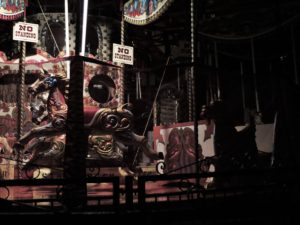You have no items in your cart. Want to get some nice things?
Go shopping It was late afternoon, but I hadn’t considered my sandwich or swig of juice; instead I tweezed bits of wood from the eye socket of a wooden man. I’d spent the day without distraction and found it gratifying, more or less—engrossed first in finishing his elbows, then in shaping his nose, and now in these happy final stages: when superficial ingredients unite into something I’d know, anywhere and after any separation, as mine. I finished the sockets and began looking for eyes in a bin of buttons when a group of children came in. They bustled straight over to my handmade cars as if they had some sort of date. (This wasn’t possible; the store is mine, I work alone, and I easily recognized my exuberant customers as strangers. Their single-mindedness impressed me, but I was not wholly aware of it until later.) The cars weaved across the shelving unit that sits propped against the west-facing wall, and the children crowded in, jostling and picking and poking. Also along that wall are the metal boats, wooden boats, pointy-chinned dolls, trees with faces, and other factory made so-and-sos that keep my store running. Customers linger here sometimes, but only for these more alluring wares. As for my cars, it was maybe their withered cigar box chassis to blame, or their cracked lollypop gearshifts; it was maybe the garbage lorry whose glass bead headlights became damaged in a store pile-up, or the multicolored bread truck, which looked like mud. Whatever their offences, collective or individual, no one wanted one. Not if I moved them from that western wall, not if I put them on sale, not if I talked them up to the mothers and fathers choosing jacks and miniature teacups. When I offered to throw one in as a special treat after a big purchase, the customers shook their heads.
It was late afternoon, but I hadn’t considered my sandwich or swig of juice; instead I tweezed bits of wood from the eye socket of a wooden man. I’d spent the day without distraction and found it gratifying, more or less—engrossed first in finishing his elbows, then in shaping his nose, and now in these happy final stages: when superficial ingredients unite into something I’d know, anywhere and after any separation, as mine. I finished the sockets and began looking for eyes in a bin of buttons when a group of children came in. They bustled straight over to my handmade cars as if they had some sort of date. (This wasn’t possible; the store is mine, I work alone, and I easily recognized my exuberant customers as strangers. Their single-mindedness impressed me, but I was not wholly aware of it until later.) The cars weaved across the shelving unit that sits propped against the west-facing wall, and the children crowded in, jostling and picking and poking. Also along that wall are the metal boats, wooden boats, pointy-chinned dolls, trees with faces, and other factory made so-and-sos that keep my store running. Customers linger here sometimes, but only for these more alluring wares. As for my cars, it was maybe their withered cigar box chassis to blame, or their cracked lollypop gearshifts; it was maybe the garbage lorry whose glass bead headlights became damaged in a store pile-up, or the multicolored bread truck, which looked like mud. Whatever their offences, collective or individual, no one wanted one. Not if I moved them from that western wall, not if I put them on sale, not if I talked them up to the mothers and fathers choosing jacks and miniature teacups. When I offered to throw one in as a special treat after a big purchase, the customers shook their heads.
And so on for years. I hadn’t made even a dollar on the amount I’d spent on parts. The time I’d put in was extensive and unrewarded. In all it was a dismal set of circumstances, and it gnawed away at me, and I should have been elated by this unexpected shift; but the sight of those critical children triggered only my defensive, possessive side. The cars were a personal affair in which I did not want other noses.
I’d stood when the children entered and then, realizing all this, sat back down.
“How many cars?” said a girl.
I dipped my hands into buttons. “Ninety seven.”
Her eyes grew big, as did the eyes of the other children.
“There’s not ninety seven,” said a boy.
“There’s not,” said a child.
“I’ll count them now,” said a girl.
I waited for her. The children elbowed each other and kicked each other’s feet, and several of them put their fingers on the cars in a position of preemptive ownership. Those fingers were an affront.
“Do you have any pretzels?” said the counting girl.
I frowned. “Did you finish counting?”
“No.” She frowned back at me. “I’m taking a break.”
“But where are you now?”
“Thirty.”
“You’ll forget where you are.”
“She’s not going to forget thirty,” said a child.
“There’s nothing forgettable about thirty,” said another.
“We’re talking about thirty right now,” said a girl. “And getting it into our heads. How could we forget?”
“It’s OK if she forgets because you and you and you and you will remember.” A serious boy pointed selectively. He seemed to have something in mind as he pointed; perhaps there was a thirty quality to our cheekbones, for it was there his finger lingered on each face.
I waited for them to quiet down. “Not the word,” I said. “The place. The place we temporarily know as thirty. Where did it go? Where are you?”
They looked at each other and sighed.
“Are you asking if we know if the sun will set tomorrow?” a girl said without malice. Her expression was calm and inquisitive. She was the sort of someone to worry about what knowledge is and what knowledge is not.
“I’m asking if among these many cars you’ll be able to tell me which you’ve counted and which you haven’t.” I addressed this to the counting girl, and her hesitant expression told me she had not thought of this. The others’ faces were taken over by similar expressions, and their feet and hands exhibited similar hesitations, and then they started counting in their heads to make up lost time—their contemplative frowns and subtle tilts giving them away—hoping I wouldn’t see.
“It’s no use,” I said. “You can’t make up lost time.”
“I can,” said a boy stubbornly. But he was not one of those attempting it. He was perfectly still, like a post.
“There are ninety seven cars,” I said. “And you can have them all for three hundred dollars.”
Their eyes grew big again.
The children were very colorful. Among them they had a variety of woolen hats, high-buttoned coats, and variegated mittens. One girl’s sweater was dotted with squares in blue, red, and yellow. Several wore snow pants with tricolored straps; several had fluffy green turtlenecks.
“Is it winter already?” I said.
But they were back to counting cars.
“Eighty,” said a boy.
“A hundred and eighty,” said a girl.
“Thirty,” said a girl.
“Fifty twenty nine,” said a boy.
“There are ninety seven cars, yours for three hundred dollars.” My faith in three hundred dollars was fading. Yes, it seemed unlikely these children would have the money to spare; money was a barrier between me and them, between them and the cars, all well and good. But their fingers, their mittens, their restless feet, the impatient rolling of their impatient heads: it all spoke to a deep conviction, a belief in their rightness as owners—of my cars—and an idea like price was suddenly useless. They seemed to think it was meant to be. But what a problematic concept.
“We’ve gotten so many different answers,” said the original counting girl. “It won’t do.”
“Do you have a box?”
“Do you have a bin?”
“Let us have that box.”
“Let us have that bin right there.”
A girl tugged my sleeve. “Or we could count them into a cat.”
Someone else began to speak: “We could count them onto that race car track—”
The tugging girl interrupted. “Please let him get counted into. He’s so sad.”
The cat was a cookie jar. I’d made him from a kit and painted him with my unsteady hand. His eyes wept into his nose, but he was smiling.
“But he’s not sad,” I said.
“He’s sad,” she said.
“I can guarantee his wonderful day,” I said.
She looked uncertain.
“He’s slept well, he’s eaten well, he’s safe and warm, what more could he want?”
“But he’s crying.”
“That’s the fault of his maker,” I said. “Those are deceiving tears. Because they’re not really tears. They’re a substance, and that substance is paint.”
She folded her arms.
“Allow me to explain,” I said. “A man-made thing like paint has nothing to do with sadness.”
But as I spoke, the children dispersed in the store. The aisles are full, so full you can hardly move without tripping into something, and such messy, swinging hands could not help but hit this and knock off that; I had to cut my lecture short because the din had grown that quickly.
“Please! Everyone! These are fragile.”
A glass barn fell off its ledge and broke. Fifty rubber balls bounced across the floor.
“We just want a box,” said a boy accusatorily, as if I was the one who’d asked him to break the barn and now his day was ruined because of it.
I gave them a box—”Here! Take it! Calm yourselves and use it!”—and it was a beautiful box, tall, with dots and stripes and triangles. Immediately the children began counting the cars into the box, each of the many of them grabbing a car and shouting one or more numbers.
“One!”
“One two three four!”
“Five!”
“One two three!”
“Four!”
“Five!”
“One two three four five six seven eight nine!”
“That’s a terrible way to count cars into a box,” I said, more to myself than anyone. I fished buttons from the bin and held two brown eyes against the face of my wooden man, but they weren’t right.
“There are ninety seven cars here,” the original counting girl said finally. But she couldn’t possibly have known.
“May we take these for an oil change?” said a serious girl.
“We need to get them checked out,” said a boy.
“They need oil,” said the girl.
“If we’re to pay three hundred dollars,” said a boy.
“Where do you plan to go?” I said.
They were little thieves, but I couldn’t see it.
A girl began to hand out peppermint sweets and fruit jellies. Whatever seething core of fighting and mishap might be found beneath my ragged skeleton, I would not have turned down those sweets and jellies. But she offered me none—merely handed them in circles to the other children and popped several in her mouth along the way. “Just down the road a ways,” she said around a sweet.
“Get them evaluated for their worth for starters,” said a boy.
“Just down the road,” said the girl.
“Get them evaluated—,” said a boy.
“They’re worth three hundred dollars and that’s their asking price,” I said. But I was already losing. They were bundling the cars in their mittens and hats.
“We’ll bundle them up like this,” said a girl.
“Please don’t,” I said, for I knew I couldn’t ask them to unbundle a car once bundled. And because it was unsettling, seeing something I’d made so finely cared for; I could no longer follow my motivations, and I no longer knew what I wanted to happen.
“It’s so they won’t be cold,” said a boy.
“So we can take them to be looked at without their getting cold.”
“We’ll take them so we’ll know your price is fair.”
“It’s for the cars’ good.”
“And yours.”
The children had put the cars in the box. The box was full to overflowing.
There was something familiar about it all. It was a road I’d been down before, and my sense was it had turned out all right. So while they were thieves, and had been so all along, I could not see it.
“Take them and be careful,” I said. “Get them evaluated and come straight back. No oil change—they don’t need anything like that. Cars are nearly slipping over the side—see here? This one could go right over if you walk too quickly or aren’t careful.”
“We’ll be careful,” they said. They looked careful. A girl pushed a car daintily, lovingly, to remove it from the brink of the box.
“We won’t walk quickly,” they said.
I held the door open for them and they left the store. It took three of them to carry the box, which had grown heavy with cars. “Come back,” I said, and twenty heads nodded.
We hadn’t established what would happen next, or what it was they wanted—what they would do or want to do—after evaluating the cars’ worth. They disappeared around the corner.
I waited, but of course they didn’t return. I walked outside and looked into the fog, and of course there was no one there.
“They were little thieves,” I said at the police station. “They were little thieves all along and I didn’t know it.”
“You’re saying they came in as thieves,” said the officer. “That it wasn’t merely a crime of opportunity.”
“It was familiar, you see,” I said. “A memory I couldn’t access. And they left with my cars like they owned them.”
The officers sat on chairs with red cushions.
“We could get them back,” said the one.
“Or try to,” said the other.
“But it probably wouldn’t help anyone.”
“You,” said the other.
“In the long run.”
“What does that mean?” I said.
“Nothing,” said the one, nervous, as if I’d become irate.
“It means you should let it go,” said the other.
“It’s not that so much,” said the nervous one. “The city is huge and full of children. Who knows which ones those were?”
“Or where they’ve gone?”
“We could pursue this, but it’ll just take your time,” said the officer.
“And then it’ll be over.”
It was both reassuring and terrible, what they said; both true and impossible. I ran through how I might explain what had happened, and how I might characterize what it meant. “The season changed early this year; it’s getting cold,” I said finally, and the two officers looked relieved.
I walked back to the shop. I picked up the rubber balls, which were all over the floor, and brushed glass barn shards into the corners where no one would step on them. The fog was beating at the window, trying to get in, so I let it in, and the late fall filled the small room very quickly. It had grown dark and city lights were going on; the skyscraper next door looks much taller at night. I hoisted the wooden man onto my shoulders. “The cars are gone,” I said.
He was still eyeless, so I told him what the store looked like, and how it was full of space.

About Lorie Broumand
Lorie Broumand is a librarian. She plays guitar, hurdy gurdy, and Tetris. Her stories have appeared or are forthcoming in Confrontation, SmokeLong Quarterly, Vol. 1 Brooklyn, Slush Pile Magazine, Whiskey Island, Memorious, Fiction Southeast, and The Cafe Irreal. She's writing a novel about a milkman.




